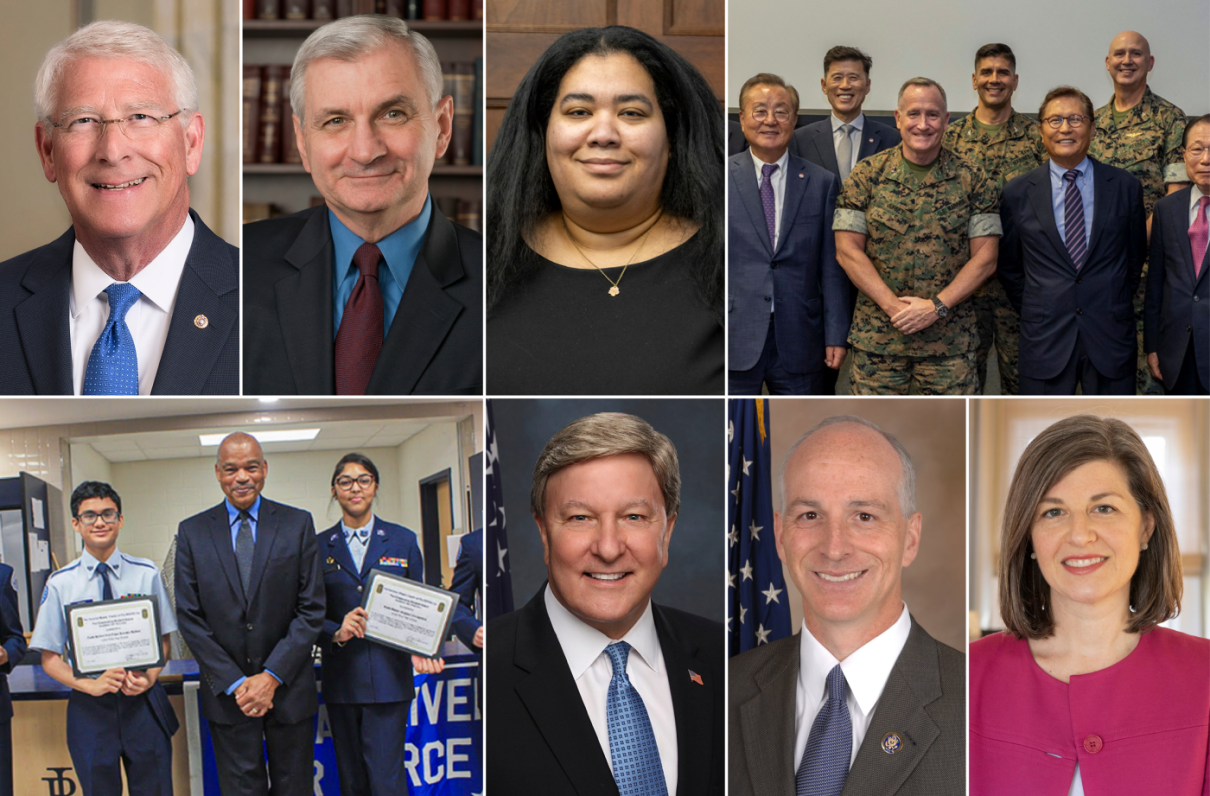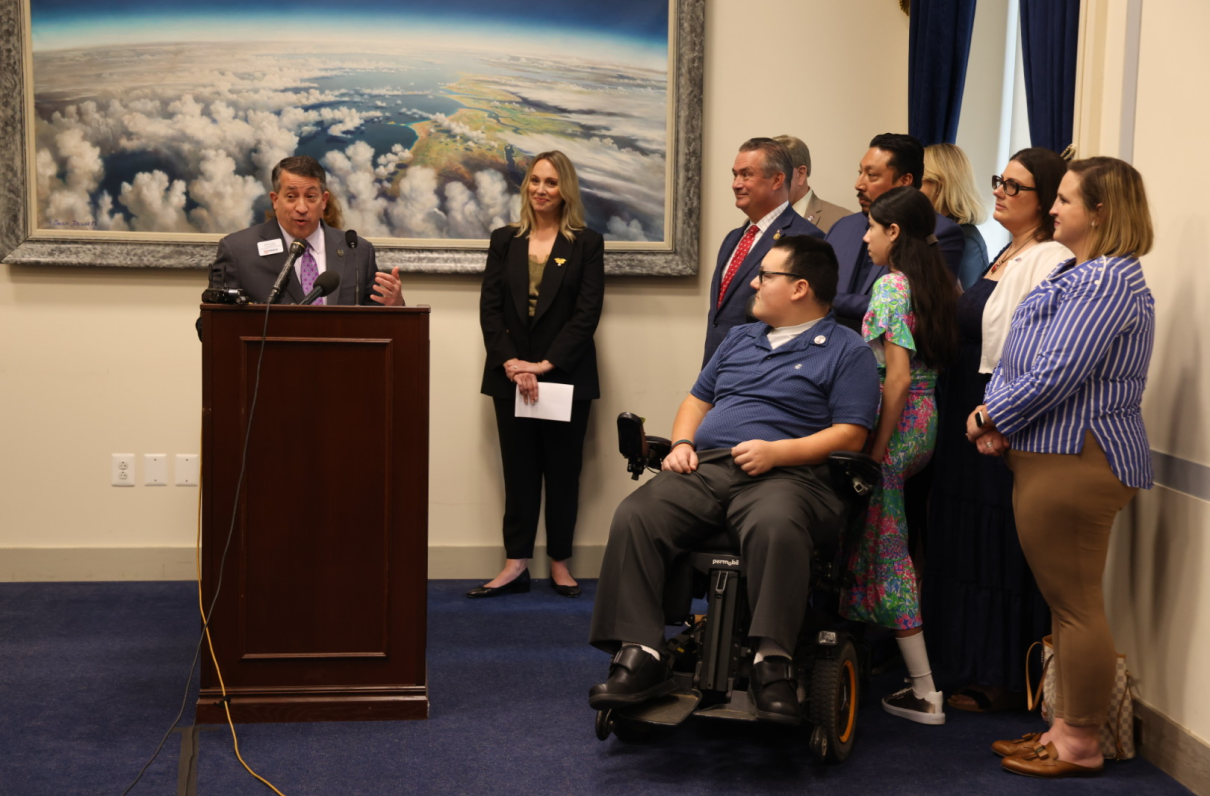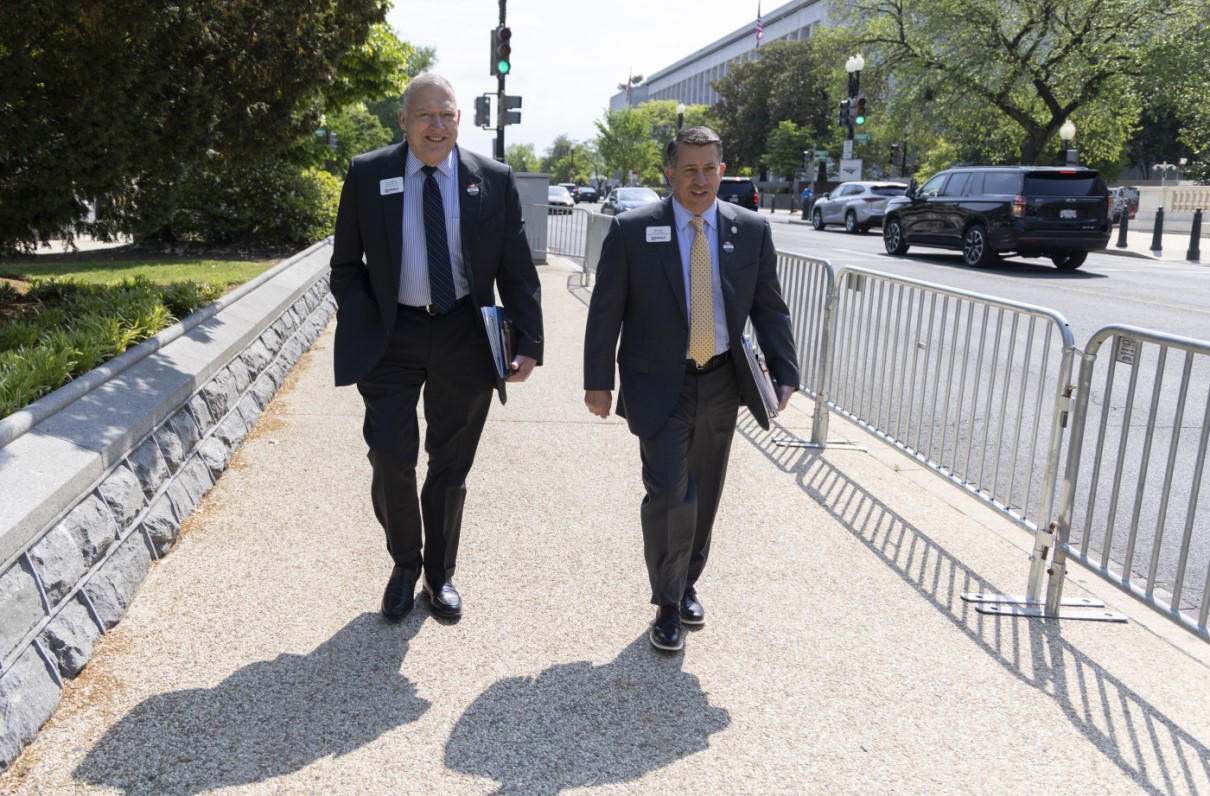(A version of this article by Charlsy Panzino originally appeared in the April 2024 issue of Military Officer, a magazine available to all MOAA Premium and Life members. Learn more about the magazine here; learn more about joining MOAA here.)
The eight recipients of MOAA’s annual awards are working to improve the lives of servicemembers and veterans, and their families. Their work ranges from increasing servicemembers’ benefits — including the largest pay raise in two decades — to creating better living conditions and mentorship opportunities.
MOAA honored its award recipients April 16 at a Washington, D.C., ceremony -- part of MOAA's annual Advocacy in Action event. Learn more about their work on behalf of the uniformed services community below; you can take part in ongoing MOAA advocacy efforts by registering at our Legislative Action Center.
Arthur T. Marix Congressional Leadership Award
Sen. Jack Reed; Sen. Roger Wicker; Rep. Mike Rogers; Rep. Adam Smith
Four members of Congress led efforts on both sides of the Senate and House Armed Services committees to help pass the FY 2024 National Defense Authorization Act (NDAA). The legislation supports $886.3 billion in funding for national defense, including a 5.2% pay increase for servicemembers — the largest pay raise since 2002.
It also includes provisions related to military families, such as authorizing DoD to increase the family separation allowance as high as $400 a month, and invests billions of dollars in other quality-of-life issues. Among them are housing, child care, health care, and career opportunities. Additionally, it authorizes a record $150 million for historically Black colleges and universities.
[RELATED: MOAA’s To-Do List for the FY 2025 NDAA]
Sen. Jack Reed (D-R.I.), chairman of the Senate Armed Services Committee, is proud the NDAA was a strong, bipartisan bill that provided a historic level of support for servicemembers, despite challenges.
“Our country faces a dangerous set of national security challenges, and it is always difficult to align the resources and dollars to match,” Reed said. “But thanks to the bipartisan nature of the committee and a thoughtful debate among all of my colleagues, we were able to produce a forward-looking bill that makes important progress to strengthen our national security.”
Reed said he was especially proud to help deliver improvements for military enlisted barracks, including replacing substandard barracks and increasing the quality, oversight, and basic standards for military housing.
“America owes a debt of gratitude to our military servicemembers and their families that can never be fully repaid,” he said. “But I am proud the annual defense bill supports their pay, housing, education, and child care access.”
[TAKE ACTION: MOAA's Legislative Action Center]
There are always challenges in finding bipartisan consensus on the national defense bill, but Sen. Roger Wicker (R-Miss.), ranking member of the Senate Armed Services Committee, credited the strong working relationships across the aisle on the committee with passing the bill.
Wicker said he will keep advocating for a defense funding level that matches the many national security threats the U.S. faces. The country must show “peace through strength,” and the servicemembers entrusted to that deserve support, funding, and resources.
“As the father of an Air Force officer [and] the son of a World War II veteran and as an Air Force veteran myself, I understand the sacrifices our courageous patriots make to defend our country,” said Wicker. “It remains a top priority in my congressional work to put these men and women first as they keep the nation safe.”
[RELATED: Good News for TRICARE in President’s FY 2025 Budget Request]
It’s especially important as multiple senior officials have testified before the Senate Armed Services Committee that “this is the most dangerous moment since World War II,” Wicker said. “It’s more vital than ever that we work to strengthen our national defense and deter adversaries like China, Russia, and Iran.”
Although the bill is “far from perfect,” according to House Armed Services Committee Ranking Member Rep. Adam Smith (D-Wash.), it reflects hard-fought compromise in a time of extreme partisan gridlock.
The NDAA underscores the country’s commitment to its allies and partners by resourcing both the European and Pacific deterrence initiatives along with enabling key parts of the AUKUS trilateral security agreement among Australia, the U.K., and the U.S, which will allow Australia to give more than $3 billion to the U.S. to strengthen its defense industrial base, Smith said.
“This sends a clear message to the world amid challenges from China, Russia, Iran, North Korea, and violent extremist organizations,” he said.
The bill’s passage emphasizes Congress’ commitment to those who serve as well as their families, Smith said.
[TAKE ACTION: Urge Your Legislators to Improve the Quality of Life for Our Servicemembers]
Rep. Mike Rogers (R-Ala.), chairman of the House Armed Services Committee, echoed that the NDAA is critically important for supporting the men and women who serve.
“It is our duty to assure our servicemembers and their families are taken care of,” he said.
Colonel Paul W. Arcari Meritorious Service Award
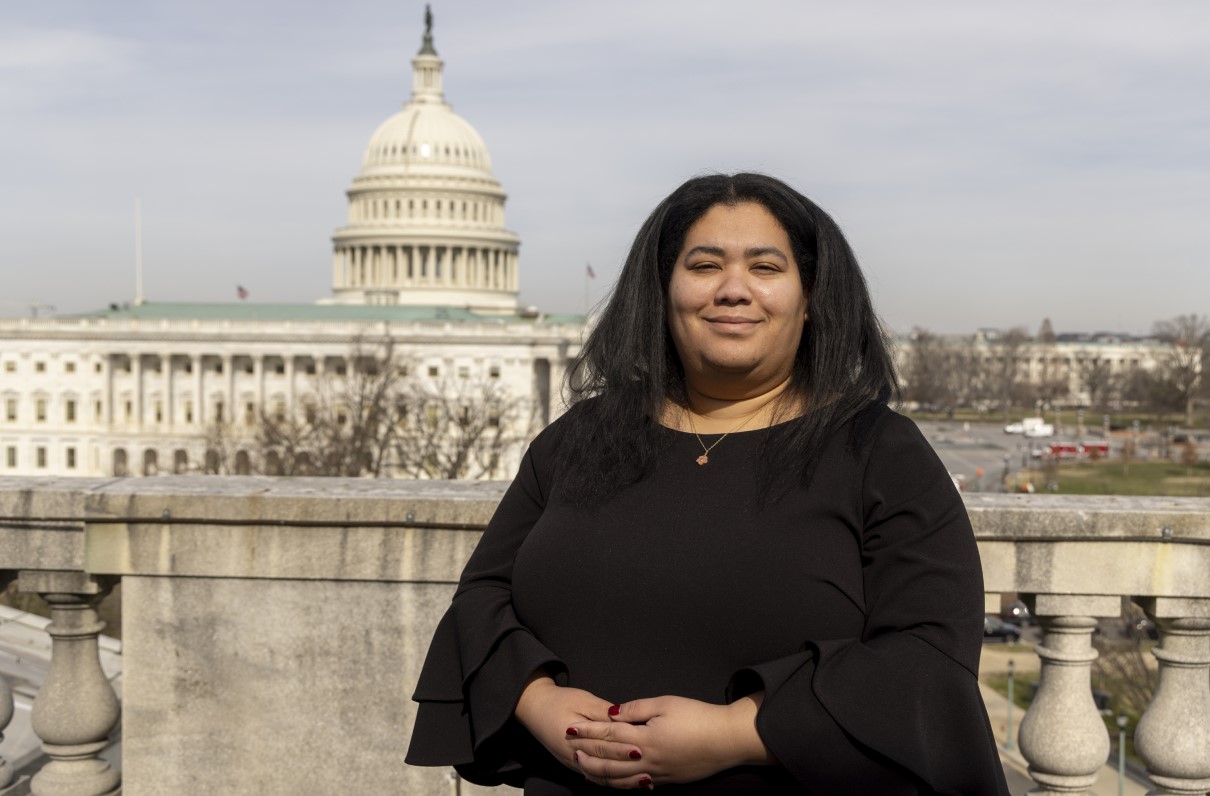
Betsy Dudley, national security advisor for Rep. Marilyn Strickland
Betsy Dudley always knew public service was part of her life plan. Both of her grandfathers served in the Army, and her father had a DoD civilian career for 30 years.
When Dudley turned 18, she started getting involved in politics and was trying to figure out how to make a difference. After interning for her home state senator in Maryland in 2015, Dudley continued to work for members of Congress. She is now a national security advisor for Rep. Marilyn Strickland (D-Wash.).
“Congress is one of those places where someone can come to you with a problem, and you might not be able to fix it right away, but you can fix it either through legislation or urging the administration to change policy,” Dudley said. “Policy isn’t instant. It’s not going to change tomorrow. So as long as you come in with that and a willingness to do the work, you can get it done.”
One of the major issues Dudley works on is military housing. When Strickland came into office, Dudley said, one of the first problems she identified was the massive waiting list for housing at Joint Base Lewis-McChord, Wash., caused by an insufficient amount of housing on base to meet the need.
“The waitlist has never been below 400 families,” Dudley said, adding that even pre-pandemic, the housing market in the area had become so active that military families were being priced out of acceptable and adequate homes.
“Where you live determines a lot of things,” she said. “If you don’t have an adequate place to live, you’re not going to be able to focus on work or your family.”
Strickland’s office is trying to ensure the Basic Allowance for Housing for servicemembers is enough and calculated correctly, along with the ongoing push to get the Army to look at building more housing on base.
Dudley is also helping Strickland address the child care issue that many military families face.
“There’s a national child care crisis, but it’s acutely felt by servicemembers who have very serious demands on their time,” Dudley said. Child care facilities might not be open early enough for a servicemember who needs to be at PT at 6 a.m., for example. This also impacts spousal employment because if there are no child care slots available, then the spouse usually stays home with their child or children.
“Military spouses are unemployed at a disproportionate rate versus their civilian counterparts,” she added.
Dudley said this work is important because the military asks servicemembers to do a lot.
“I don’t just mean go to war,” she said. “We ask people to move every two to three years, we ask them to take time away from their families and go out and exercise in the field.”
The goal is to ensure servicemembers can have good, financially stable lives.
“We want people to do their 20 [years] if they want to,” she said. “The best way to do that is to make sure their first enlistment or first term as an officer is … a pretty good experience.”

Elizabeth Field, former director at the Government Accountability Office
Elizabeth Field worked for the Government Accountability Office (GAO) for 15 out of the past 22 years, in two separate stints that taught her how to help make the government operate more effectively. Her first eight years at the GAO focused on international affairs and trade, which she found so interesting that, in 2010, she took a position with the Special Inspector General for Afghanistan Reconstruction.
“I saw firsthand — when I visited Kabul and other parts of Afghanistan — just how much we put on servicemembers in terms of the sacrifices they make and the conditions that they experienced in conflict zones,” Field said.
After later working at the Department of State for about three years, Field rejoined the GAO in 2017 as a director, which meant she oversaw a broader portfolio of work and could represent the agency.
She was placed in the Defense Capabilities and Management group about a year before news came out about concerns with the condition of military housing, especially privatized family housing. Field put together an audit team to look into the issue, and it became clear quickly this was a broken program where servicemembers were living in bad conditions.
“As I was starting to go out and visit installations around the country and sit down in discussion groups … it was really compelling what they were saying and showing us,” Field said. “It’s hard not to feel really passionate about the work that you’re doing when you realize how much of a direct impact it has on people’s lives.”
Field’s work at the GAO has contributed to requirements Congress put in place for DoD to do a better job managing family housing as well as unaccompanied housing.
This includes keeping a closer eye on what private developers are doing and paying attention to what servicemembers and their families are saying about their living conditions and taking them seriously, she said.
“Because of the work I did on military housing with the GAO, I really got a richer sense of the needs that so many military families and veteran families have,” Field said, adding that housing is just one piece of that.
“I really have found that I’m passionate about these issues, and I want to be involved in efforts that are even more directly about helping military families,” she said.
This is why she left the GAO in February to become chief operating officer for the Elizabeth Dole Foundation, which supports military caregivers.
The foundation takes a research- and fact-based approach to designing interventions to help support military caregivers and their families, Field said.
“There’s still so much work that we have to do, and I’m excited about helping out,” she said.
Distinguished Service Award
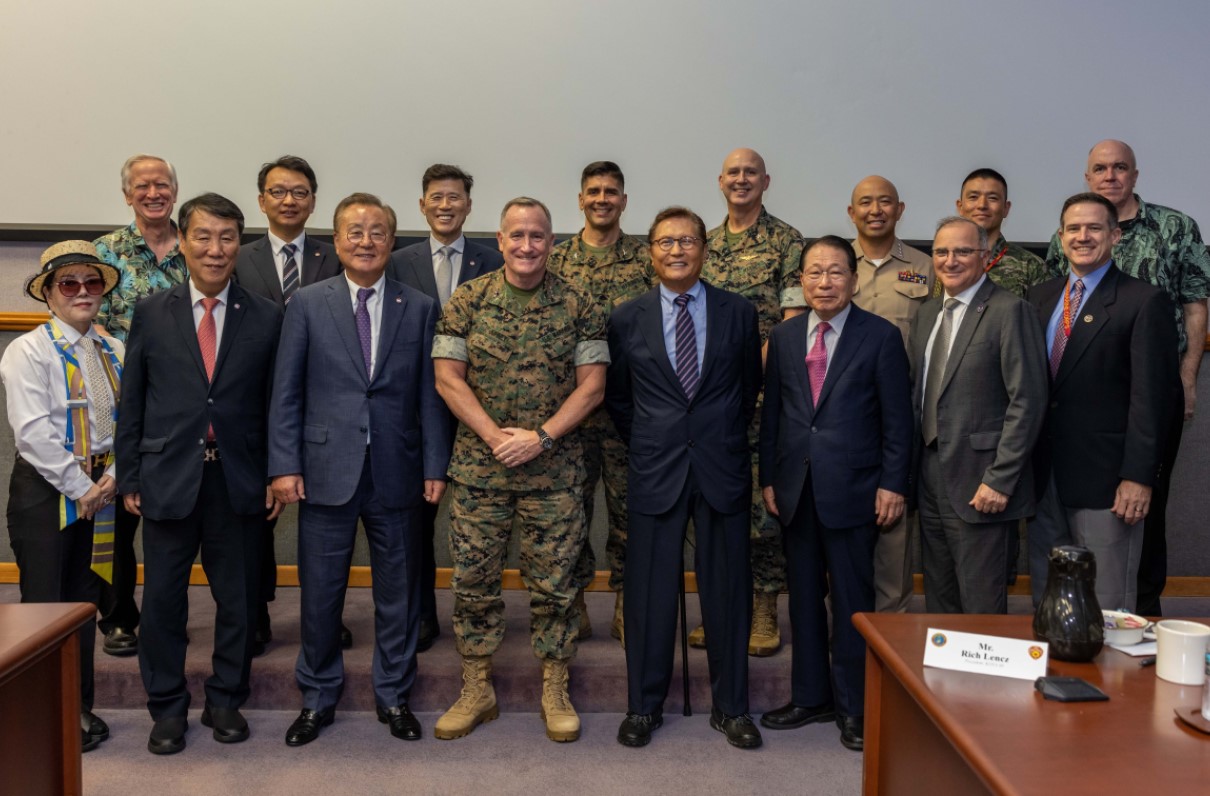
Korea Defense Veterans Association
The Korea Defense Veterans Association (KDVA) wants to grow its membership and outreach in 2024 so the millions of Americans and Koreans who served in the Republic of Korea can see how their service mattered.
The association supports the U.S.-Republic of Korea Alliance and has partnered with the Korea U.S. Alliance Foundation, or KUSAF.
This year, KDVA will open new local chapters across the U.S., increase its virtual common-interest groups on its member portal, and start several new campus clubs, said KDVA Chairman Gen. Curtis Scaparrotti, USA (Ret). The association will continue programs geared toward veterans, including the Korea Revisit Program, in which the Korean government pays for veterans to visit Korea.
“This program gives Korea defense veterans the opportunity to return to Korea and see the places where they were stationed, connect with other Korea defense veterans, and see how their service changed the lives of the Korean people,” Scaparrotti said, adding the program grew to 100 veterans and their companions in 2023.
KDVA also supports the younger generation with scholarships and internship programs.
The association has seen record growth the past three years, including surpassing 10,000 members and increasing social media followers to more than 80,000.
“The perspective of why we have so much work ahead of us and why our outlook is so positive is there are 5.1 million Americans who have served in Korea since the Korean War,” said Col. Steve Lee, USA (Ret), KDVA senior vice president of operations.
“Their service matters,” Lee said. “It’s mattered in so many ways for both Americans and Koreans, and it’s changed history for the Korean people and made American lives better.”
The biggest challenge KDVA faces is getting the word out to potential members, he said, adding that membership is free.
There will be two to three more U.S. chapters opened as well as five to 10 campus clubs at colleges. Students can register the clubs and plan activities, while KDVA will provide funding and social media support as well as get speakers to attend social events, Lee said.
The mission statement of KDVA was purposely broad, Lee said, as the association did not want to limit itself in what it can do to support the U.S.-Republic of Korea Alliance and its veterans.
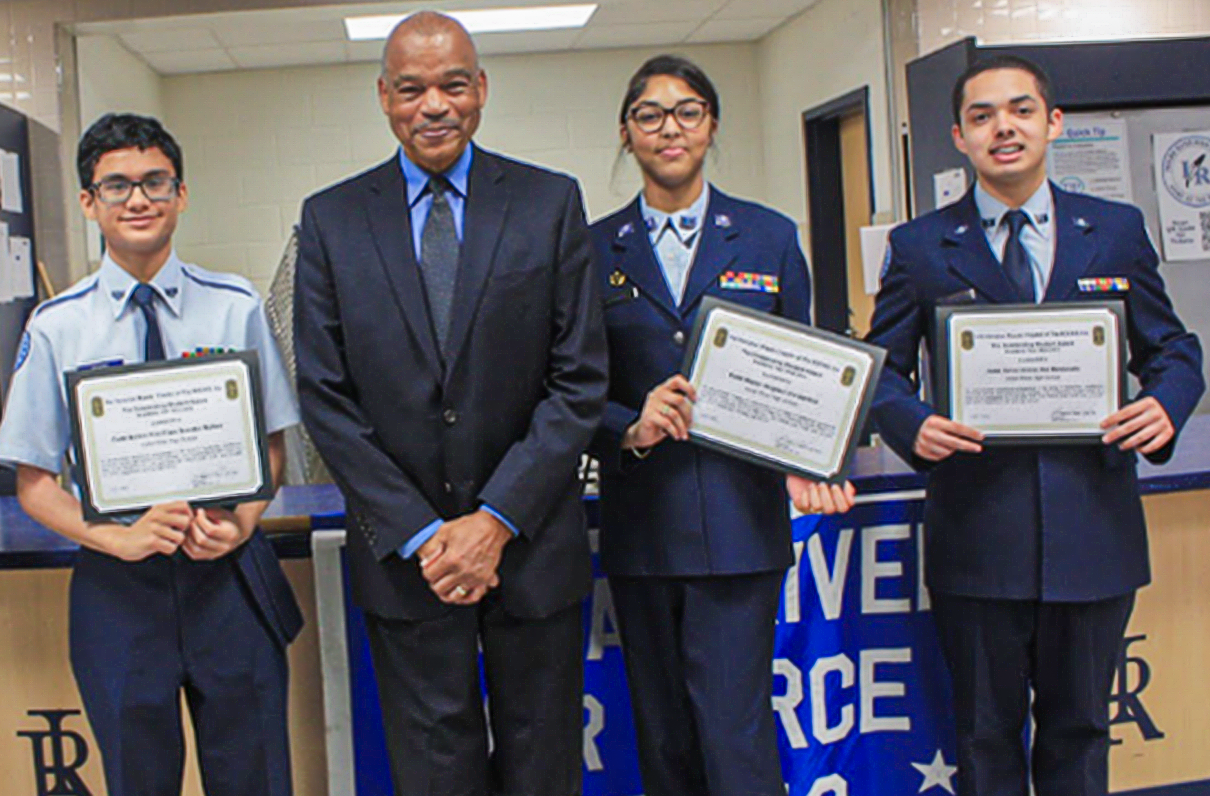
The ROCKS Inc.
The ROCKS Inc. has been working to fill the gaps when it comes to mentorship in the Army, especially for those in underserved communities.
In the 1960s, a group of minority students at the Command and General Staff College at Fort Leavenworth, Kan., started studying together. After graduating and going their separate ways, several of the students were eventually stationed at the Pentagon. They decided to get the group together again in an official capacity, which is how The ROCKS was formed.
The name came from Brig. Gen. Roscoe “Rock” Cartwright, USA, a founding member who died in a plane crash as the group was standing up.
The ROCKS is dedicated to building a stronger and more diverse Army workforce, said Col. Ray Bingham, USA (Ret), national vice president of communications and publications.
A major focus is providing scholarships for junior and senior ROTC students. The ROCKS partnered with U.S. Army Cadet Command, which “allows us to go out and find students from underserved communities … and walk them through how to compete for Army ROTC scholarships,” Bingham said.
The ROCKS guides these students through the scholarship process, and Cadet Command awards the scholarships on behalf of the organization.
“Those students then are going to schools — all schools, not just historically Black colleges. They go to any school of their choice,” he added.
In 2023, $7 million in ROTC scholarships were awarded, according to Brig. Gen. Lawrence Gillespie, USA (Ret), board chairman.
The ROCKS also focuses on helping students at schools that have a lot of ROTC students but not a lot of support. While the student population at the U.S. Military Academy at West Point is similar to the Army ROTC program at a school like Howard University, the supporting cadre at West Point is much larger.
“The students at Howard, without organizations like us, could never be on par with West Point,” Bingham said. “When a second lieutenant from West Point graduates and shows up to his unit at the same time as someone from Howard University, they are not equal.”
Most chapters of The ROCKS are off campus, but in 2023, the first on-campus chapter — besides chapters at West Point, the Virginia Military Institute, and the Army War College — was created at Hampton University in Virginia.
“We’re using it as a test bed that we might go to other historically Black colleges and universities or other universities that want a ROCKS chapter and use the model that we are developing at Hampton University … so we can get to cadets early and often,” Bingham said.
This year, The ROCKS is working to spread awareness about the organization and continuing to provide mentorship and education opportunities to the next generation of soldiers.
“We want to … help the Army to achieve the goals they want to achieve,” said Gillespie.
Charlsy Panzino is a writer based in Idaho.
Military Officer Magazine
Discover more interesting stories in MOAA's award-winning magazine.
